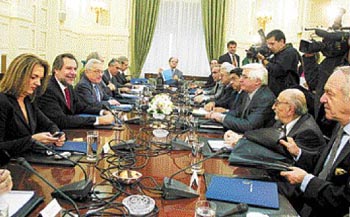Greek parties seek to forge a consensus o the FYROM name issue as Athens awaits final proposals from a UN envoy
Greece's political parties reached a temporary, uneasy truce at a meeting of the National Council on Foreign Policy, following the uproar stirred by UN envoy Matthew Nimetz's latest proposals on the name of the Former Yugoslav Republic of Macedonia (FYROM).
Christos Papoutsis, Pasok's representative to the council, which is a government advisory body comprised of members of all parliamentary parties and met on October 18, declared that his party seeks to achieve "consensus on strategic goals in order to serve national interests", but he underlined that the opposition will not let up on its criticism of the government's handling of foreign policy. "That in no way means we are offering a blank check, or that there is consensus in covering up the government's handling of particular matters, its tactical choices or the results of its policy," he said, expressing support for continuing UN-sponsored negotiations on the name issue.
Nimetz's proposals entailed the phased-in international usage by 2008 of FYROM's constitutional name, Republic of Macedonia, while Greece would call its northern neighbour Republika Makedonija-Skopje (adding the country's capital as a suffix to a Slavic rendition of the name) in its bilateral relations. The United States recognised FYROM by its constitutional name in November 2004, joining over 100 other countries that have done the same.
Foreign Minister Petros Molyviatis did not present the opposition parties' representatives with a copy of the Nimetz proposals. He told journalists after the meeting only that the government immediately rejected the proposals and "from here on is handling the matter with lucidity, responsibility and always with the criterion of ensuring Greece's national positions and goals".
While the council also reviewed the upcoming discussion of the final status of Kosovo, which is widely viewed as the cause of US eagerness to resolve the name issue, neither Molyviatis nor any opposition party even mentioned the matter publicly.
Over the last few years, Greece has abandoned its public opposition to any change of Balkan borders, long a mantra in Athens' foreign policy statements, presumably in response to Washington's determination to offer Kosovo sweeping autonomy or independence from Serbia. But when asked by the Athens News if Greece still opposes border shifts in the Balkans, foreign ministry spokesman George Koumoutsakos on October 20 said that this remains Greece's policy. Koumoutsakos stressed that decentralisation and protection of the non-Albanian minorities and Orthodox cultural monuments must be part of the settlement of the final status of Kosovo.
Washington appears to maintain that a resolution of the FYROM name issue in a way that satisfies Skopje would help resolve a lingering identity crisis and underline international support for the territorial integrity of a country where tensions between the Slav majority and huge Albanian minority have reached the brink of civil war. It is believed that this would also facilitate implementation of the 2001 Ohrid agreement, which granted the Albanians broad local autonomy.
But many in Greece believe that the prospect of any independent Kosovo as early as 2006 will only serve to fuel a secessionist push by FYROM Albanians. The mass-circulation Athens daily Ta Nea on October 17 reported that Washington - and in particular Undersecretary of State Nicholas Burns, who served as ambassador to Athens during the US Kosovo campaign - is paving the way for a Greater Albania that would bring together Albania, Kosovo and parts of FYROM.
Diplomatic observers in Athens suspect that Nimetz's next - and final - proposal will, in fact, be the adoption of the name Republika Makedonija in international affairs. That proposal is hardly new, as it was the core of a December 2001 recommendation by the think tank International Crisis Group (ICG), which often follows the orientation of US foreign policy. The ICG proposal entailed that the new name would be enshrined in an Athens-Skopje treaty, to be recognised by diplomatic notes from Nato and the EU. The treaty would offer Athens "important concessions", including "declarations on treatment of the Greek cultural heritage in the Macedonian educational curriculum, agreement that Greece could use its own name for the state of Macedonia, and strict protection against any Macedonian exploitation of its constitutional name to disadvantage Greece commercially or legally".
Indeed, Greece is most concerned about the cultural usurpation of the ancient Macedonian heritage by Skopje and the accompanying expansionist rhetoric, which views the northern Greek province of Macedonia (seat of the ancient kingdom) as "Aegean Macedonia", essentially as an un-liberated part of the modern Slavo-Albanian state of FYROM. The problem is highlighted by school textbooks, where the Greek character of the ancient Macedonian kingdom is rejected and large portions of northern Greece are depicted in maps as part of FYROM.
Charles Ries, the US ambassador to Athens, told the daily Ta Nea on October 10 that the US recognised FYROM by its constitutional name in order to avert the country's destabilisation due to secessionist tendencies by the Albanians. But he added that Washington supports Nimetz's efforts to reach a solution that would be acceptable to both Skopje and Athens.



